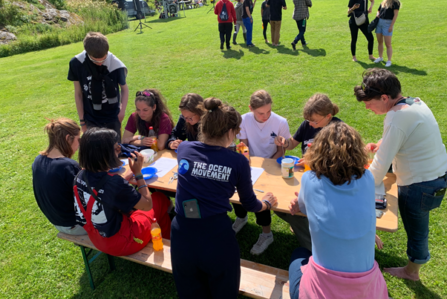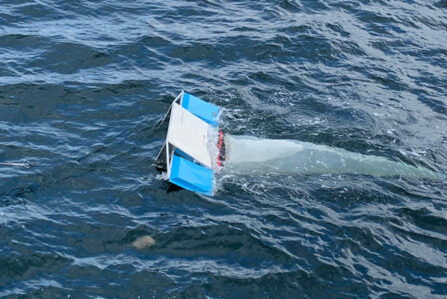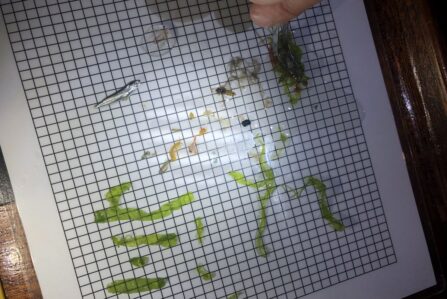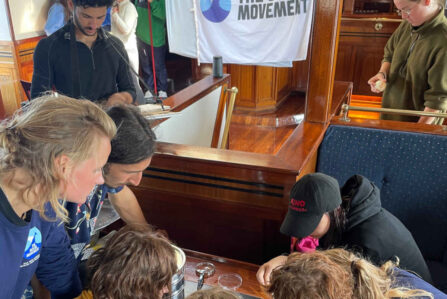Report prepared by The Ocean Movement
The Ocean Movement Foundation
We are on a mission to stop plastic pollution from ending up in our ocean. With the Manta trawl, we are gathering data on microplastic pollution in the waters that we sail in. Together with the trainees we learned about the plastic pollution problem by doing research, lectures and workshops. By participating in projects that combine research, adventure, cultural exchange, and sustainability, the trainees become ocean ambassadors, who spread the word about sustainability like ripples in the ocean. We believe that we should unite forces to tackle this incredibly complex problem.
The Manta trawl
The Manta trawl is a scientific research device designed to take microplastic samples from the surface of the water. The trawl skims the top 15 cm of the water. The net collects all the plastic particles that float in the top layer of the sea. Collected particles are then characterized and counted. With a flowmeter, we measure the total amount of water flow. Finally, we calculate the concentration of plastic particles in the water.
The goal of this research is to make the invisible visible for the trainees and crew onboard. They are all actively involved in taking the samples and analyzing them on board. Additionally, the data is shared with the public and other parties to provide insight into the pollution of the seas.
The protocol we follow is a citizen science protocol from the Trawl share program created by the 5 Gyres Institute, San Francisco (USA). This standardized protocol is designed to process the samples on board and assure the quality of the processing. We experienced that it provides a great opportunity to involve participants with the processing of the samples, maximizing the impact and awareness. This form of citizen science, guided by experts, provides a great opportunity to get the expedition crew involved, giving more insight into the complex problem which is plastic pollution, reveals how research is conducted, and ensures the collection of data for relatively low costs.
The plastic program
We created a supporting program that increases the awareness of the problem of plastic pollution. This includes a presentation in quiz-style, which encompasses different subjects related to plastic pollution, such as its history, the problems for nature, problems for humans, and the possible actions we can take. We use a quiz form for an interactive approach, to let the participants actively think and discuss the answers. Additionally, we organize a workshop in which we check our toiletries for microplastics and show what we can replace them with. We make our own toothpaste and deodorant to show how to make it plastic-free with items from everyone’s cupboard. We also create extra space to discuss the problem of plastic pollution and other environmental challenges the Earth and society faces.
Research results in 2023
During the expeditions on the Thalassa and the Gulden Leeuw in the summer of 2023, we collected a total of 10 samples. 100% of these samples contained microplastic particles. This is in line with other research on plastic pollution. Microplastic particle pollution has been found nearly everywhere scientists have looked for them. From the preliminary results we know that the average particle count was 10,551 particles per square kilometer, with a maximum of 23,685 particles per square kilometer. The maximum count of particles in one sample was 75 pieces in 30 minutes trawling. The higher particle counts were found in the Skagerrak area.
Take-home message
Microplastic pollution is a widespread problem affecting all ecosystems, including wildlife and humans. Research is needed to create awareness and show the urgency of the problem. We believe that everybody is part of the solution to plastic pollution. We can all do something, such as switch to plastic-free alternatives and reusables, but also use our voice to spread the message.
Our work
The Ocean Movement is a nonprofit organization that can only do its work with support of others. All the funding goes to awareness and research projects that support the fight against plastic pollution in our ocean.
Join plastic research journeys with The Ocean Movement
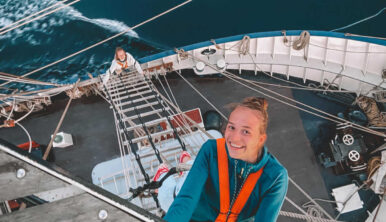

Aalborg (DK) - Tórshavn (FO)
02 Aug 2026 - 14 Aug 2026
